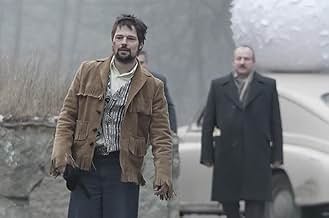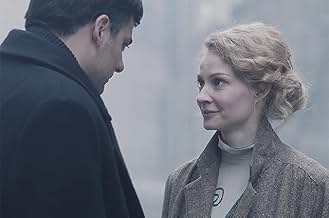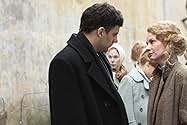CALIFICACIÓN DE IMDb
6.4/10
2.3 k
TU CALIFICACIÓN
Seis días en la vida del brillante escritor que vio más allá de los rígidos limites de la Rusia soviética de los 70.Seis días en la vida del brillante escritor que vio más allá de los rígidos limites de la Rusia soviética de los 70.Seis días en la vida del brillante escritor que vio más allá de los rígidos limites de la Rusia soviética de los 70.
- Dirección
- Guionistas
- Elenco
- Premios
- 5 premios ganados y 11 nominaciones en total
Danila Kozlovsky
- David
- (as Danila Kozlovskiy)
Tamar Hovhannisyan
- Nora Dovlatova - Sergei Dovlatov mother
- (as Tamara Oganesyan)
Anna Yekaterininskaya
- Deputy director of the plant
- (as Anna Ekaterininskaya)
Sergei Tolstov
- Factory Newspaper Editor
- (as Sergey Tolstov)
Maria Järvenhelmi
- Finnish tourist
- (as Mari Yarvinkhelmi)
Nikolai Shatokhin
- Dovlatov's friend
- (as Nikolay Shatokhin)
- Dirección
- Guionistas
- Todo el elenco y el equipo
- Producción, taquilla y más en IMDbPro
Opiniones destacadas
In Soviet times, no one needed talent. Mediocrity ruled the ball, with talented people suppressed, gifted ones even harder - having been afraid of, like a primeval creature is scared and therefore responds aggressively to anything inexplicable. Those talented, having no way of expression, finding no audience, reading audience first of all, would fall into nothingness unless fled abroad or drowned in vodka. This was consistent and gave no chances to artists in developing anything worth reading. But the talent was nonetheless stronger and many infiltrated the history of literature. What Soviet leaders promulgated was easily captured locally, in chief editor's offices, writers' union, even by sellers of forbidden books trembling for their lives and freedom. Total ignorance, straightforwardness, and ultimate desire to crush any individuality made its way to exterminating any roots of artistic calling that has been so strong in the Russian literature before Soviets. That's when the genocide started whose fruits we have along, with the post-Soviet ravenous lust for money having superimposed and inflicted the last strike.
Across the ocean, the world saw beatniks to be the last whose nervous, preagonic howl loomed over the world of big literature, eventually resulting in poor language and rhetoric of late post-modernism with its too much relying on commercialization and losing the essence. What we have now is the outcome of how polar types of societies evolved to squeeze profound art from both sides leaving no place for genius looking for an exit of its artistic power. These days, there is no room to even write a word unless it brings profits to the publisher.
Both Soviet masses and elites were not ready to new trends having no desire to read about trifles rather than something big. Leaving general all-humanity topics for small things was a border between modernism and post-modernism and was for sure better perceived in developed countries rather than those built by narrow thinking of power-holding minorities. Brodsky finally left for the US to be honored a Noble prize, which may be argued about as a politically motivated act, but no one doubted his talents except for those who were afraid that his literary actions may rock the boat of stable way to a better future (which we may very well observe now as well, huh). Whether they did understand that their work is used for political games in this new world, that we don't know, but what we got in the end is a collapse of literature as we, or previous generations, knew it. Through years of struggle, true art has lost its positions and we'll never see it as before again, with the last man of letters having perished at the turn of the century.
As for Dovlatov, Ernst Neschastny once wrote: "He was drinking as hell, drowning himself in alcohol, as generations of Russian men before him - dark Russian alcoholism with the only purpose of slowly killing themselves, reaching the end they were seeking so much, trying to elude the reality they couldn't fix or live in." This is what we don't see in the film, but what we should know. Being unacknowledged throughout his life and finding glory only after his death, Dovlatov remains an image of how the system mutilates fates and lives. Those who he called "low and pathetic people" were the one responsible for their country and its future that we have now. They are to be blamed for narrow-mindedness, vanity, stupidity, thirst for power, and personal ambitions. After all these years, we still see it in federation-level decision makers.
The closing scene is of course the most important one showing how hard it is, emotionally, socially, and physically, to overcome the pressures coming both from inside and outside and follow your way. "Don't listen to no one, your books are your business. It's going to be hard but you will find inner power" sounds like parting words to every artist in doubt. And being such, Dovlatov makes a final line concluding his existence and, perhaps, alluding, in part, to any human's life: "Still we exist, always drinking, in worn out shoes, poor, and sometimes talented. We still exist. We are and we will be. The only way not to lose yourself is to go through that thorny way of hopes, disappointments, and losses. "
It's not an easy movie for the viewer. However, it is an addictive cinema. The film is a biography of a writer who did not live to see his work published during his lifetime, so it focuses on impotence, unfulfillment and bitterness. A few days from Dovlatov's life, which we observe on the screen, is therefore a pretext for showing his everyday work - the attempts to publish a text instead of a little ambitious journalistic texts, showing his family and friends, the bohemian environment of Leningrad / St. Petersburg.
The film has a very calm rhythm, it is beautifully photographed and well played. The central figure is the ubiquitous Milan Maric (strikingly similar to Sergei Dovlatov), but although he is present on the screen in almost every scene, he does not dominate history and other characters.
Definitely worth seeing is a film for all those who are interested in showing the creative process on screen or in the reality of life in Soviet Russia.
The film has a very calm rhythm, it is beautifully photographed and well played. The central figure is the ubiquitous Milan Maric (strikingly similar to Sergei Dovlatov), but although he is present on the screen in almost every scene, he does not dominate history and other characters.
Definitely worth seeing is a film for all those who are interested in showing the creative process on screen or in the reality of life in Soviet Russia.
Saw this at the Berlinale 2018, where it was part of the Competition for the Golden/Silver Bear. A lot of faces pass by, in crowded apartments or various other just as crowded places. Some of those faces will reappear several times. No need to remember all of them, apart from the main protagonist, his ex-wife and daughter of course, as there is no continuing story that brings you from A via B and C to Z.
The division in six days is also not really relevant. It gives you a clear marker, however, that the movie jumps to something completely different each time a date appears on screen. It provides for some structure albeit not crucially important.
There is room for humor, not too much as there is no happy ending (no spoiler: we know this writer was not recognized in his own country and emigrated later, and we also know his own country valued him not until after his death).
Be prepared for name dropping of several famous writers, most of whom I recognize vaguely by name, but have never read them in my life. Maybe you have better luck in fitting them in the context in which their name is mentioned, and judge the name dropping as appropriate or merely done out of pomposity (I assume the former, given the circles our main protagonist usually is in, where one surely knows these names and would protest immediately when improperly quoted).
Trick question: did this movie enlighten me about the period and Russian politics at the time?? No, I think not. But anyone who has read some of the writers who have been quoted, may think otherwise. Several reviewers mentioned that it was a time of a stand still.
What this movie makes abundantly clear, is that the regime does not allow frivolities with their policy, keeping a tight lease on all publications such as journals, magazines and books. It is something that all such regimes seem inclined to do as a matter of course. Is that only to close the ranks, out of fear that the communist dream is not so rosy as one is taught?? Or it is just to not endanger the positions of the current politicians?? I assume that all of the above applies. It seems to apply equally to contemporary dictatorial regimes (Turkey, Iran, and many others), a parallel observation that makes this movie more relevant than it intrinsiccally is when considering the Brezjnew period alone.
The division in six days is also not really relevant. It gives you a clear marker, however, that the movie jumps to something completely different each time a date appears on screen. It provides for some structure albeit not crucially important.
There is room for humor, not too much as there is no happy ending (no spoiler: we know this writer was not recognized in his own country and emigrated later, and we also know his own country valued him not until after his death).
Be prepared for name dropping of several famous writers, most of whom I recognize vaguely by name, but have never read them in my life. Maybe you have better luck in fitting them in the context in which their name is mentioned, and judge the name dropping as appropriate or merely done out of pomposity (I assume the former, given the circles our main protagonist usually is in, where one surely knows these names and would protest immediately when improperly quoted).
Trick question: did this movie enlighten me about the period and Russian politics at the time?? No, I think not. But anyone who has read some of the writers who have been quoted, may think otherwise. Several reviewers mentioned that it was a time of a stand still.
What this movie makes abundantly clear, is that the regime does not allow frivolities with their policy, keeping a tight lease on all publications such as journals, magazines and books. It is something that all such regimes seem inclined to do as a matter of course. Is that only to close the ranks, out of fear that the communist dream is not so rosy as one is taught?? Or it is just to not endanger the positions of the current politicians?? I assume that all of the above applies. It seems to apply equally to contemporary dictatorial regimes (Turkey, Iran, and many others), a parallel observation that makes this movie more relevant than it intrinsiccally is when considering the Brezjnew period alone.
Maybe not the best. for Comunism. for Dovlatov. for the atmosphere of Soviet Union. the cause - the less courage/art/science of director to move the things out of superficial perspective. sure, for a Eastern public, it works. for the memories about period, for the lectures about it, maybe for the familiarity of Dovlatov and Brodsky writings. but it is not real enough . the good point - the work of Danila Kozlovsky. but this is not a surprise.
10gokselll
What a good movie!!!
In this movie audience witnesses a week of Russian author Dovlatov's life. Panoramic view of those seven days shows interesting details of everyday lives of intellectuals and artists in the late period of USSR.
Within a plain but masterfully designed visual composition, with no agitative langue, the movie presents satirical sub-texts on pressure of state-bureaucratic principles on artistic production, degeneration of USSR administrative regime and confliction of factual-economical position of artist in life and existential and inherent artistic motivation etc...
Critics on state-art relation in this movie not only satire historical conditions in USSR but also compose a general and actual critical sense on relevant matters indicating negative picture of the ideal conditions.
Watching "Dovlatov" is a great cinematic pleasure, a great experience!
In this movie audience witnesses a week of Russian author Dovlatov's life. Panoramic view of those seven days shows interesting details of everyday lives of intellectuals and artists in the late period of USSR.
Within a plain but masterfully designed visual composition, with no agitative langue, the movie presents satirical sub-texts on pressure of state-bureaucratic principles on artistic production, degeneration of USSR administrative regime and confliction of factual-economical position of artist in life and existential and inherent artistic motivation etc...
Critics on state-art relation in this movie not only satire historical conditions in USSR but also compose a general and actual critical sense on relevant matters indicating negative picture of the ideal conditions.
Watching "Dovlatov" is a great cinematic pleasure, a great experience!
¿Sabías que…?
- ConexionesFeatures Romantyczni (1970)
Selecciones populares
Inicia sesión para calificar y agrega a la lista de videos para obtener recomendaciones personalizadas
- How long is Dovlatov?Con tecnología de Alexa
Detalles
Taquilla
- Total a nivel mundial
- USD 2,187,653
- Tiempo de ejecución2 horas 6 minutos
Contribuir a esta página
Sugiere una edición o agrega el contenido que falta

![Ver Trailer [OVS]](https://m.media-amazon.com/images/M/MV5BZjQ0ODcwYTMtZmU2OC00ZDFlLTkyZTgtY2Y0NDFjMjJmNmZlXkEyXkFqcGdeQXRyYW5zY29kZS13b3JrZmxvdw@@._V1_QL75_UX500_CR0)






























